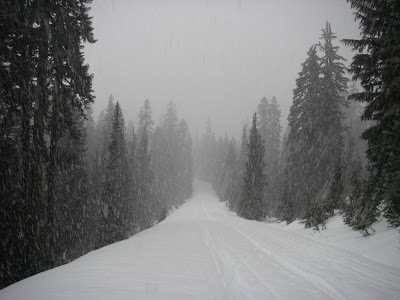 |
| Wizard Island on the spectacularly clear Crater Lake |
 |
| Epic amounts of snow can fall in a single day |
Crater Lake is one for the record books. Its the deepest lake in the United States; it is 1,949ft or 350m deep. This is a fantastic depth considering the lake is essentially a circular lake that's only 5-6 miles across (8-10km). As mentioned earlier, the snowfall in Crater Lake is unmatched by most places in the US and the world. In the winter of 1948-49 it received an incredible 822 inches (over 2,000cm) of snow. This record has only been surpassed by Thompson Pass in the Churgach Mountains of Alaska. Winter at Crater Lake can be a beautiful wonderland or a blizzard depending on the day or even time of day. Lastly, the lake is the clearest in the world. It is common for the visibility to be over 100ft (30m).
If you're wondering why I'm specifying standard and metric measurements, it is because this blog has gone international with viewers from every continent except South America and well... Antarctica.
 |
| West rim of Crater Lake |
Crater Lake's beauty is surely augmented by a white blanket of snow. The lake's only island "Wizard Island" appears even more mysterious when snowcovered and the lake seems to become more reflective. Only the main entrance road is plowed in the winter meaning anyone coming up should carry car chains. The highway that circles the the park and lake becomes a highway only for snowshoers and cross country skiers. The park asks that travelers along the snowcoverd highway leave two separate tracks for snowshoers and skiers but usually there isn't enough traffic to create a discernible route. Often winter travelers will attempt to circumnavigate the lake. This is a serious 33 mile trip which can be several days on snowshoes. It is quite enjoyable to penetrate deep into the wilderness of the north end of the park and it feels as if you have a National Park to yourself.
 |
| Perfect pathway! |
 |
| From Hillman Peak |
Interestingly enough, there is a downhill ski and snowboard route which exists in the winter. The Raven trail parallels the road up to the lake. You would have to do a car shuttle from bottom to top, but it would be a cool thing to say "I skied Crater Lake!" I've never skied Crater Lake before, but I was interested to know that it is possible!
Remember that the weather can change on a dime. The rangers at the lake will let you know that you have about a 50% chance of driving up and never seeing the lake when a storm comes up. And of course, bring your snow chains in every month thats not June, July or August. Good luck and enjoy the lake in the off season!
Read. Plan. Get Out There!





No Comments